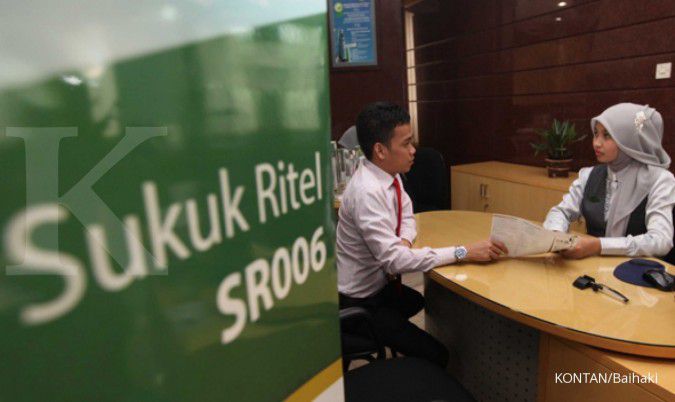JAKARTA. Sharia banks are nonchalant about the government’s plan to issue retail sukuk, or Islamic bonds, next year, which could result in several customers moving their money from sharia banks’ deposits to the Islamic bonds. Sharia bankers instead say that any government plan to expand retail sukuk issuances next year will have minimal impact on the sharia banking industry’s funding portfolio. “Of course we will see some kind of impact, but not all of our customers, especially time deposit [TD] customers, will immediately switch to the sukuk because such investment form requires deeper insight,” Achmad K. Permana, the sharia banking director of PermataBank, said on Friday. Achmad, who is also secretary-general of the Indonesian Sharia Banks Association (Asbisindo), said that the domestic bond market — including Islamic bonds — was still largely dominated by conventional customers who emphasized the return aspect of an investment, rather than pure sharia principle. PermataBank itself had Rp 5.75 trillion (US$467.98 million) in TD portfolio under its sharia business unit, according to the lender’s September financial report. Permana also dismissed the notion that retail savings sukuk would sway sharia banking customers, citing the government’s relatively small funding target. “It will be less than 1 percent of the industry’s current asset size,” he said. Latest sharia banking statistics issued by the Financial Services Authority (OJK) show that the total assets amounted to Rp 244.2 trillion by the end of September. Earlier this week, the government laid out its bonds issuance plan for 2015 in its effort to generate funds to spur economic growth. Part of the plan includes the issuance of retail sukuk, which will take place in the first quarter of 2015. Next year’s issuance will be the seventh that the government has conducted so far. The Finance Ministry’s director for sharia financing, Suminto, said that the Islamic bonds would have a maturity period of three years. “We set our indicative target at around the same level as last year,” Suminto said. In 2014, the target stood at Rp 14.9 trillion. Besides retail sukuk, the government is also assessing its plan to issue a much smaller scale of sukuk called retail savings sukuk. If the plan is realized, the debt papers will be available for purchase at a price range of Rp 5 to Rp 10 million, with a possible fund target of Rp 1 to Rp 2 trillion. Meanwhile, Dinno Indiano, president director of Bank Negara Indonesia (BNI) Syariah, said that the bank’s customers would not necessarily choose the sukuk over TD, citing the maturity period difference. “They are required to keep their money longer in sukuk than in time deposits. That is something to consider,” he said. BNI Syariah, a subsidiary of state lender BNI, had Rp 7.75 trillion in time deposits as of September, as revealed by its financial report. Separately, Mandiri Sekuritas fixed income research head Handy Yunianto voiced a similar opinion as Permana and Dinno, saying that in terms of size, the retail sukuk had not matched what the sharia banking industry had recorded so far. (Tassia Sipahutar)
Sharia banks keep their cool on govt’s sukuk plan
JAKARTA. Sharia banks are nonchalant about the government’s plan to issue retail sukuk, or Islamic bonds, next year, which could result in several customers moving their money from sharia banks’ deposits to the Islamic bonds. Sharia bankers instead say that any government plan to expand retail sukuk issuances next year will have minimal impact on the sharia banking industry’s funding portfolio. “Of course we will see some kind of impact, but not all of our customers, especially time deposit [TD] customers, will immediately switch to the sukuk because such investment form requires deeper insight,” Achmad K. Permana, the sharia banking director of PermataBank, said on Friday. Achmad, who is also secretary-general of the Indonesian Sharia Banks Association (Asbisindo), said that the domestic bond market — including Islamic bonds — was still largely dominated by conventional customers who emphasized the return aspect of an investment, rather than pure sharia principle. PermataBank itself had Rp 5.75 trillion (US$467.98 million) in TD portfolio under its sharia business unit, according to the lender’s September financial report. Permana also dismissed the notion that retail savings sukuk would sway sharia banking customers, citing the government’s relatively small funding target. “It will be less than 1 percent of the industry’s current asset size,” he said. Latest sharia banking statistics issued by the Financial Services Authority (OJK) show that the total assets amounted to Rp 244.2 trillion by the end of September. Earlier this week, the government laid out its bonds issuance plan for 2015 in its effort to generate funds to spur economic growth. Part of the plan includes the issuance of retail sukuk, which will take place in the first quarter of 2015. Next year’s issuance will be the seventh that the government has conducted so far. The Finance Ministry’s director for sharia financing, Suminto, said that the Islamic bonds would have a maturity period of three years. “We set our indicative target at around the same level as last year,” Suminto said. In 2014, the target stood at Rp 14.9 trillion. Besides retail sukuk, the government is also assessing its plan to issue a much smaller scale of sukuk called retail savings sukuk. If the plan is realized, the debt papers will be available for purchase at a price range of Rp 5 to Rp 10 million, with a possible fund target of Rp 1 to Rp 2 trillion. Meanwhile, Dinno Indiano, president director of Bank Negara Indonesia (BNI) Syariah, said that the bank’s customers would not necessarily choose the sukuk over TD, citing the maturity period difference. “They are required to keep their money longer in sukuk than in time deposits. That is something to consider,” he said. BNI Syariah, a subsidiary of state lender BNI, had Rp 7.75 trillion in time deposits as of September, as revealed by its financial report. Separately, Mandiri Sekuritas fixed income research head Handy Yunianto voiced a similar opinion as Permana and Dinno, saying that in terms of size, the retail sukuk had not matched what the sharia banking industry had recorded so far. (Tassia Sipahutar)




